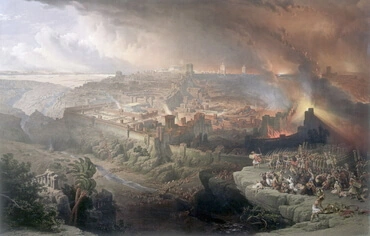In the ancient world cities were nearly nations unto themselves – they existed within walls, with their own laws and customs, generally centered on the common purpose of trade. This is not as much the case in the modern world, but we still tend to divide ourselves city by city in terms of sports teams, accents, music and culture, and still tend to generalize the character of people from other cities. It follows, then, that in the Bible cities represent various doctrines – collections of inter-related ideas about spiritual reality. Such doctrines can be based on anything from the Lord’s true teachings – the New Jerusalem seen by John in Revelation – to the falsity and heresy of Sodom and various cities obliterated by the people of Israel at God’s command. On the most personal level, a city can also represent the natural mind of one person – which makes sense since we each to some extent have our own doctrine and our own set of ideas and beliefs.
Heaven and Hell # 197
197. It follows from this that in the Word places and spaces, and all things that in any way relate to space, signify such things as relate to states, such as distances, near, far off, ways, journeys, sojourning, miles and furlongs, plains, fields, gardens, cities and streets, motions, measures of various kinds, long, broad, high, and deep, and innumerable other things; for most things in man's thought from the world take on something from space and time.
[2] I will mention here only what is signified in the Word by length, breadth, and height. In this world, that is called long or broad which is long or broad in relation to space, and the same is true of height. But in heaven, where there is no thought from space, length means a state of good, breadth a state of truth, and height the distinction between them in accordance with degrees (see 38). Such is the meaning of these three dimensions, because length in heaven is from east to west, and those that dwell there are in good of love; while breadth in heaven is from south to north, and those that dwell there are in truth from good (see 148); while height in heaven applies to both of these in respect to degrees. This is why length, breadth, and height have these significations in the Word, as in Ezekiel (from chap. 40 to 48), where the new temple and the new earth, with the courts, chambers, gates, doors, windows, and surroundings are described by measures giving the length, breadth, and height, by which a new church, and the goods and truths that are in it are signified. Otherwise to what purpose would be all those measures?
[3] In like manner the New Jerusalem is described in the Apocalypse in these words:
The city lieth foursquare, and the length thereof is as great as the breadth; and he measured the city with the reed, twelve thousand furlongs; the length, the breadth, and the height are equal (Apocalypse 21:16).
Because "the New Jerusalem" here signifies a new church these measures signify the things of the church, "length" its good of love, "breadth" truth from that good, "height" good and truth in respect to degrees, "twelve thousand furlongs" all good and truth in the complex. Otherwise, how could there be said to be a height of twelve thousand furlongs, the same as the length and the breadth? That "breadth" in the Word signifies truth is evident from David:-
Jehovah, Thou hast not shut me up into the hand of the enemy, Thou hast made my feet to stand in a broad place (Psalm 31:8).
Out of straitness I called upon Jah; He answereth me in a broad place (Psalm 118:5).
Besides other passages (as in Isaiah 8:8; and in Habakkuk 1:6). So in all other cases.







